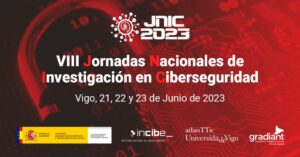The conference is organised by Gradiant and atlanTTic (Universidade de Vigo) with the collaboration of the Spanish National Institute of Cybersecurity (INCIBE).
It will focus on three main areas: Research, Transfer and Teaching Innovation in Cybersecurity; through various sessions and round tables.
The experts Mordechai Guri and Carmela Troncoso will participate next week in the VIII Jornadas Nacionales de Investigación en Ciberseguridad (JNIC) to be held in Vigo from June 21st to 23rd. The event is the main reference in exposing the advances, knowledge and innovation in cybersecurity at national level, and will be held for the first time in Galicia, after previous editions in León, Granada, Madrid, San Sebastián, Cáceres (online edition during the pandemic) and Bilbao.
The conference is organised by the Centre for Research in Telecommunication Technologies of the University of Vigo, atlanTTic, and the Gradiant technology centre. The initiative has the collaboration of the Spanish National Institute of Cybersecurity (INCIBE).
Disruptive Technologies, Cybersecurity and Quantum Technologies
JNIC is a scientific conference for the exchange of knowledge and experiences in the field of cybersecurity between academics, researchers and companies. The conference will focus on three axes: Research, Transfer and Educational Innovation in Cybersecurity; through various sessions and round tables.
The event’s programme includes two keynote talks with internationally renowned speakers in the field of cybersecurity. Mordechai Guri, computer expert and security researcher, will present in his lecture “Air-Gap Security: Attacks and Defence” concealment channels for communication with physically isolated networks. On the third day, Carmela Troncoso, PhD at KULeuven and Associate Professor at EPFL (Switzerland), will address in her lecture “Privacy by design: from paper to practice”, different interpretations of this philosophy of digital systems design, with examples of the use of technologies designed to improve privacy (Privacy Enhancing Technologies) combined with systems that allow complex functionalities without the need to collect or process data.
In addition to the ten sessions in which the selected papers will be presented, two round tables will allow to discuss about Disruptive Technologies and the role of cybersecurity or the horizon in quantum technologies during the first and second day of the event.
“It is an honour for Gradiant to be able to organise this national cybersecurity conference. Since its creation, cybersecurity has always been a clear strategic commitment of Gradiant, which we have strengthened in recent years as it is one of the essential technologies for digital transformation along with connectivity and artificial intelligence, which make up the areas of expertise of the centre. This determined and continuous commitment has led us to become a benchmark, and we continue to work to improve day by day,” says Lilian Adkinson, president of the organising committee of the JNIC 2023 by Gradiant.
“AtlanTTic is particularly proud to be organising this national cybersecurity conference. Cybersecurity is one of the three major strategic areas that form the backbone of our scientific agenda, an area in which we have been working since the Centre was founded in 2010 and which, in this time, has consolidated us as a benchmark thanks to the scientific excellence of our research staff, the projects and collaborations of international reference, and the driving initiatives promoted in areas such as quantum communications, 5G/6G security and trusted environments for AI”, says Ana Fernández Vilas, chair of the organising committee of the JNIC 2023 by atlanTTic.
The conference is supported by Axencia para la Modernización Tecnolóxica de Galicia (AMTEGA), Nodo Galego de Ciberseguridade CIBER.gal, Consorcio de la Zona Franca de Vigo, Seresco, Plexus Tech, Cátedra R en Ciberseguridade, RENIC (Red de Excelencia Nacional de Investigación en Ciberseguridad), Eviden, Optare Solutions, Viewnext and CITIC (Centro de Investigación en Tecnologías de la lnformación y las Comunicaciones).



